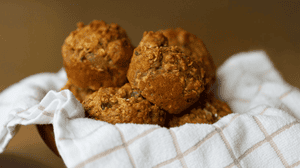As a parent, nothing is more important to you than the health and wellbeing of your child. We move heaven and earth to protect them and keep them safe, but this is not always an easy task. Whilst you might be able to reduce the risk of them falling and grazing a knee or do your best to shield them from nasty bugs, keeping their gut healthy is not always as straight forward.
With so much processed and fast food being aimed squarely at children, parents are fighting a constant battle between keeping their little ones happy and doing what is best for them. This has become ever more challenging in recent years, and so it has become even more important than ever to keep an eye on the gut health of your child.
We all need a little help from time to time, which is why we have put together this indispensable guide all about gut health for your child. Together, we will explore what this means, why it is so important and what steps you can take to support your child's gut health.
What is gut health?
Many of us are aware that our guts are home to lots of bacteria; in fact, there can be trillions of them helping to process the food that we eat, help our body to maintain balance and keeping us healthy. This gut microbiome creates its own ecosystem with more than a thousand different species of bacteria living there. Even more interesting, this microbiome is unique to all of us – it first starts to form during childbirth and chest feeding, and then develops based on our diet and environmental exposures.
Our gut health can influence a number of factors within our bodies. The gut microbiome may have a role in the regulation of our immune system, the function of the brain and determining how nutrients are digested and used within the body. This just goes to show what an important piece of the overall health picture of our bodies that gut health can be, so it is therefore important to ensure that we pay attention to gut health throughout our lives, starting in childhood'.
3 signs of a healthy gut
As we cannot see or feel the bacteria in our guts, it can go unnoticed, which means it is often hard to determine whether we have a healthy gut or not. However, there are signs to watch out for.
Regular bowel movements
The first sign of a healthy gut relates to our bowel movements, and if you are a parent of a very young child, this is something that you can easily keep an eye on. Less so as they grow older! Children should be pooping in a regular fashion, and this can be anything from one soft poo a day to four times a week – the important thing is to look for changes in the normal patterns for your child in order to spot a potential problem.
Healthy stools
The second sign to look out for is what the poop itself actually looks like. A healthy stool should have a smooth texture and should be shaped like a sausage that is either one large stool or several smaller ones. They should also sink once they are in the toilet bowl. Anything that is lumpy, hard, runny or a different colour might indicate an unhealthy gut.
No bloating or pain
When it comes to the third sign of a healthy gut, you should be looking out for a child who is not bloated or in pain on the toilet. Passing stools should not be painful, so being able to do so comfortably is often a sign of a healthy gut. Those with gut health issues often find that they suffer from persistent bloating, pain or nausea. If you have any concerns about your child’s bowel movements or associated symptoms (swollen tummy), please seek advice from your doctor.
Is gut health important for kids?
We often think of gut health as an issue for adults, but it is also incredibly important for kids. It is believed that the gut microbiome remains flexible until around the age of four to five, meaning that there is a good opportunity to build up strong gut health in the young – the more established the microbiome becomes, the harder it can be to change.
As the gut is where we absorb most of our nutrients, it is important to ensure that our children have healthy guts which can provide them with everything that they need. When children eat processed foods, the amount of nutrients that they consume is reduced through the ingredients used, so it is important that the gut is working efficiently in order to absorb as many nutrients as possible.
Up to 80% of the immune system is located in the gut as this is the place that the majority of bugs enter the body. This means that the gut can act as the first line of defence for our children, so it is important that it is kept as healthy as possible in order to be effective when it comes to protecting kids against illnesses, allergies and intolerances.
A connection has been found between the gut and the brain which can also be very important for children. The microbes in the gut can help to produce the chemical neurotransmitters which send messages between the gut and the brain, as well as other chemicals that affect the brain through the bloodstream. It is believed that the gut microbiome may be involved in a number of neurological, mental health and functional gastrointestinal disorders. This relationship between the gut and the brain can have a big impact on the mood and behaviour of a child as well as their cognitive abilities.
How can I improve my child's gut health?
It is clear that the gut health of your child is incredibly important, so it is essential that you do all you can to support it. There are many ways to do this, including helping to restore good gut bacteria, but where is the best place to start?
How do you restore good gut bacteria in children?
Just like the rest of us, good gut bacteria want good conditions to live in, so it is important to feed those bacteria exactly what they need. Known as prebiotics, foods which are high in fibre, e.g. yogurt, sauerkraut, can play an important part in keeping gut bacteria healthy which supports the digestive system, as can cutting back on any processed and artificially sweetened foods.
It can also be beneficial to add more of the good bacteria to the gut through live culture like yoghurt, or through specially designed probiotics which may complement and support the natural gut microbiota.
What foods are good for kids’ digestion?
To aid good digestion, it is important to give children a diet that is high in fibre, although this is not always as easy as it sounds! Grains, fruits and vegetables are all great, and the fibre found in whole grains such as wholewheat bread, brown rice, bananas and berries can help to keep the gut healthy. Fermented foods which contain live, active bacteria like yogurt, kefir and aged cheese are also useful.
Should kids take probiotics?
More research is required, but some studies have suggested that probiotics may be beneficial in improving digestion, as well as improving the immune system function and reducing the risk of autoimmune diseases, asthma and allergies.
Parents are understandably careful about what they give to their children. You should always ensure that probiotics are from a reputable supplier and that the probiotics you have chosen are suitable for the age of your child. Probiotics may support the gut health of your children, through beneficial bacteria, at an age where their diet can otherwise be difficult to control.
Related Articles







